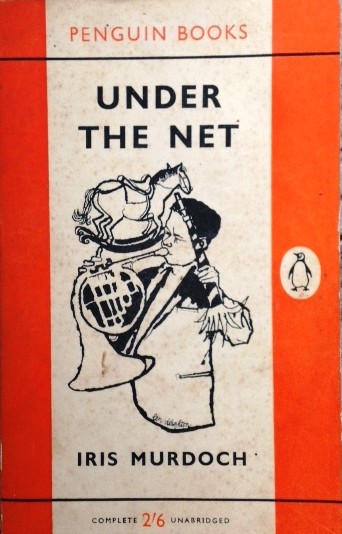Inspiring Older Readers
 posted on 16 May 2022
posted on 16 May 2022
Under the Net by Iris Murdoch
This was Iris Murdoch’s first novel published in 1954 and found itself being lumped alongside some unlikely bedfellows. Writing for the London Review of Books in 2019, Michael White quotes Malcolm Bradbury when he noted that Under the Net:
‘was hailed as part of the “angry” movement and closely associated with such books as Lucky Jim, Hurry on Down and even Room at the Top’
I guess that these comparisons really sprung from the nature of the central character, Jake Donaghue – charming, hapless, penniless and somehow adrift – and the fact that the book takes him on a series of more or less unlikely picaresque adventures. Just as Lucky Jim depends on us liking or identifying with Jim Dixon or Hurry on Down needs us to take Charles Lumley to our bosom, so your enjoyment of Under the Net hinges on how you feel about Jake Donaghue. And I’m not at all convinced his feckless charms were enough to compensate for the increasingly unlikely coincidences and events that were needed to make the plot work.
Famously, Iris Murdoch’s other identity was as a philosopher and there’s plenty of evidence of this alternative persona that leaks across into the book – the importance of language and the role it plays in creating and not just describing reality, is at the heart of the central relationship of the book between Jake and Hugo Belfounder. There are also a lot of tangential references to other philosophical icons – especially Jean-Paul Satre – but, in the end it’s the comedy set-pieces that I suspect will stick with most readers. There’s always a joke or farcical set-piece that’s not far away and an incipient disaster waiting around the corner to sabotage Jake’s pursuit of love and money.
The short review of the book from Kirkus makes what I think is a perceptive observation:
“It is one of those novels in which a lot more is meant to have been said than actually ever is.”
I’ve not tried to reconstruct the plot with all its twists and turns because I’d end up filling several pages but it seems to me to be undeniable that the book has all the hallmarks of a first novel by a writer who would go on to do more substantial work.
What is undoubtedly a triumph in the novel is the way Fifties London takes on a tangible, three-dimensional existence in the pages of the book. It feels as if the lives of many of the characters are lived more fully on the streets and in the pubs than they are in houses or flats – many of Jake’s travails come from his seemingly endless search for somewhere to live. London becomes a key character in the story, a fact that is well articulated by John Wilson on the London Fictions website:
“Under the Net is Iris Murdoch’s first novel. It is also by far the most “London” of her novels. While several of her later novels are set in London – often in upper-middle-class homes in West Brompton – only in Under the Net is the city an essential part of the story. Far more of the action takes place on the street than in any of her later novels. The mood of the story varies with the character of the district in which each part is set, including the extensive bomb-sites that still existed at the beginning of the 1950s. The writing captures not only of the appearance but also the atmosphere of place. Except for chapters 7 and 8 about Holborn Viaduct and the City bomb-sites, most places are evoked impressionistically by one or two details. Particularity is mostly achieved by the names of streets and pubs and the numbers of bus routes.”
Iris Murdoch’s reputation has seen something of a decline over recent years and I’m not sure why she has slipped down the literary reputation pecking-order despite all that she went on to achieve. But there are signs that the tide is turning again and I note that her 1978 novel, The Sea, The Sea, is included in the recently announced ‘Big Jubilee Read’. For those who want to explore her extensive output, Under the Net as probably her lightest and most accessible book wouldn’t be a bad entry point.
Plenty of cheap paper and hardbacks can be found but if you want a first edition you’ll need to have deep pockets.
Terry Potter
May 2022